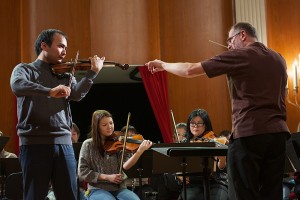Director Vladimir Kirajiyev of Bulgaria, who works in Austria, visited Astana Opera to see the largest theatre in Central Asia, built in just three years. He spoke with The Astana Times about his impressions.
 How did you decide to be a director?
How did you decide to be a director?
In my family we had no musicians. My father was an engineer, my mother a teacher. When I was six, I began to play the piano and then was part of pop groups. I took lessons in harmony, pitch and sight singing, and suddenly I got a chance to try conducting, which happened to suit me.
To learn how to conduct does not mean that you will become a director, however. At first I was a choirmaster; everyone in Bulgaria starts with this. Then I tried with an orchestra, worked in an opera house and started immediately on performances, but it was not easy. Later, I moved to modern music: I was invited to an orchestra that played only modern music. I learned how to conduct 15 years later.
When you are a pianist or violinist, you can practice on your instrument. When you’re a conductor, no one lets you practice with their orchestra. I learned how to manage it over a long time; it is a long process.
You have been a guest director in many leading theatres; you know firsthand what international orchestras are like. Having had an opportunity to get acquainted with Astana Opera’s orchestra, what do you think of it?
This orchestra has great potential. Take the international orchestras that have worked for many years: the average age of people there is 50-60 years old. Astana Opera’s orchestra’s average age is 25-30 years old. The potential that these guys have is rare: after two or three rehearsals, they can learn anything. This orchestra has a great future. Some Western orchestras have a great past, a good present, but there is no future.
Do you have your own individual methods of working with orchestras?
I would say I have different methods for different countries. In Eastern orchestras they perceive you differently. Here, they show respect to you as a teacher. In the West, everything is different: people perceive you as a professional, they are silent when you enter, when you say something, they might respond or not. When I work with local orchestras, I see that they are trying to understand and immediately do, and every day they are better and better. In the West, it is better not to talk; showing with your hands is best. You don’t know whether they will respond or not, so it is better not to talk. Regarding Astana Opera’s orchestra, I must say, these guys did some things they should do.
Should the director be the rational head or should he provide the orchestra with enthusiasm?
The director a priori must have authority, but certainly he should inspire, because nothing can be done without motivation. Each team has its own energy. The director, as the motor, should move the orchestra to give emotion.
Don’t you feel exhausted after rehearsals of emotional works?
This is absolutely true. Of course it takes a lot of energy; when I go to sleep and wake up around three in the morning, I feel exhausted. During rehearsals you can control the emotion, but still you should be energising everyone.
Where does your energy and inspiration come from?
Inspiration comes from work, from meeting musicians, from new orchestras. Each new piece of music that is worked out gives me new enthusiasm. I’m at an age when much has happened already. I want to repeat works already done, but in another way, using a different experience, with other ideas and other concepts, in order to create a new artistic experience. Inspiration comes from being able to recreate pieces in a different way.
What else would you like to do, in addition to being a director?
We directors keep in mind two points: one emotional, the other rational. To be a good director, you need to find a happy medium. If you’re seized with emotion, there is no control over the orchestra; if you follow only rationality, everything turns cold and dull. I teach a lot, I work in the Academy of Music in Vienna with young directors, do new versions of works. Those are activities outside of directing, but I still believe that it is karma to be a director, you cannot refuse it easily.
Is this your first time in Kazakhstan?
Yes, and I feel very comfortable here. I loved Astana Opera—it is chic, with wonderful acoustics. I did not expect that somewhere in the East there would be such a new city, where every street is 50 metres wide and it’s 200 metres from one building to the next. I thought I was in Tokyo or Dubai. I thought I had wandered into a fairy tale.

